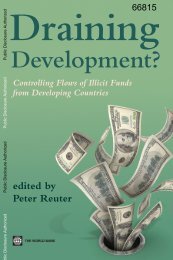04 CHRISTOPHER NM.pdf - Khazar University
04 CHRISTOPHER NM.pdf - Khazar University
04 CHRISTOPHER NM.pdf - Khazar University
- No tags were found...
Create successful ePaper yourself
Turn your PDF publications into a flip-book with our unique Google optimized e-Paper software.
68 Nkechi M. Christophethe youth, to wit: “Music on sex, drugs, bad leadership and money help toaggravate violent tendencies in youth and make them display more of thesetendencies in their communities,” a student surmises. In addressing the issue ofviolence in, and as a product of, youth music, the students illustrated theirperception of the music scene with examples. Put together, the essays give apicture of youth music scene in Nigeria as well as insight to the interaction betweenmusic and society, of which this article attempts to present.Popular music scene in Nigerian: hip hop reignsAlthough in no way restricted, the students focused mainly on hip hop music intheir essays; probably because they were most familiar with this form. Also, hiphop is pervasive, notorious and cannot be ignored; it, in fact, seems to be drowningout other genres of popular music. It is markedly the music by youth and for theyouth. Over the years, highlife and other forms of hybridised music had met theneeds of the urban adult public; the youth were largely ignored, as children still are.Essentially, as highlife, youth music/popular culture is urban creation which targetsurban youth. Prior to the recession of the 1980s, Nigerian youth were content withforeign music. However, the recession and subsequent austerity measuressignificantly reduced access to foreign cultural products, probably due tounprecedented devaluation of the naira (Nigerian currency) which caused the pricesof foreign goods to shoot up beyond the reach of the ordinary person and broadcastmedia. Globalisation and increased access to satellite television provided theincentive for satiating the starvation of several years. Idle youth adopted the hiphop and rap genre which required the use of electronic instrument already availablein the environment.Until they discovered hip hop urban youth in Nigeria had no enduring local musicof their own, created for or by them. Youth merely participated as chorus or playedinstruments for adult musicians. Today, the youth have taken advantage oftechnological innovations – and have identified with the global culture ofpostmodernism, especially exultation in the gratification of impulses – to createtheir own kind of music. In addition, a fortuitous nascent democratic dispensationpermits them to infuse diverse messages about the frustrations experienced in thesociety. Of most concern, though, is that Nigerian youth musicians may escalatesocial maladies through graphic presentation of social taboos, using particularly thehip hop musical form.
















